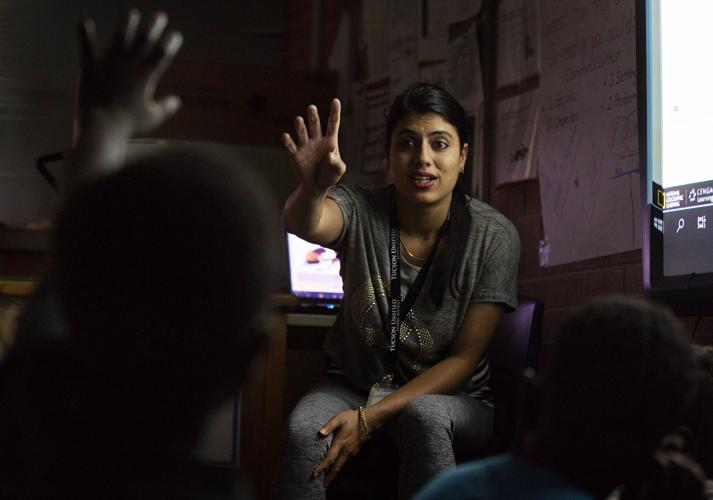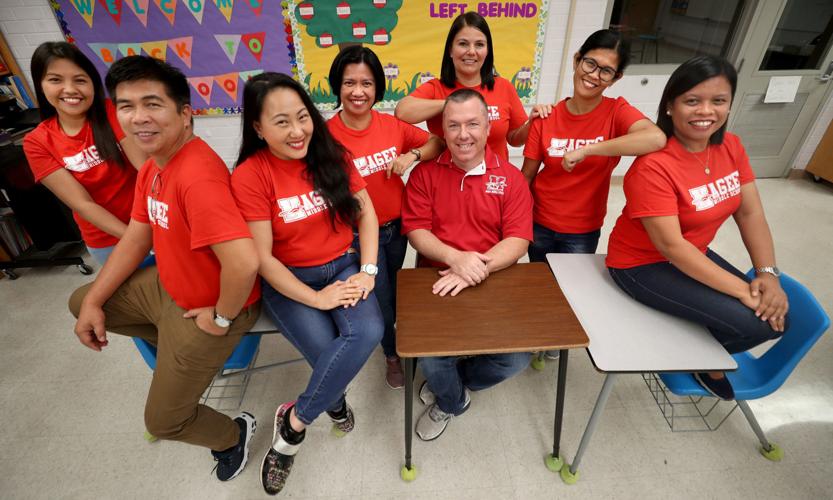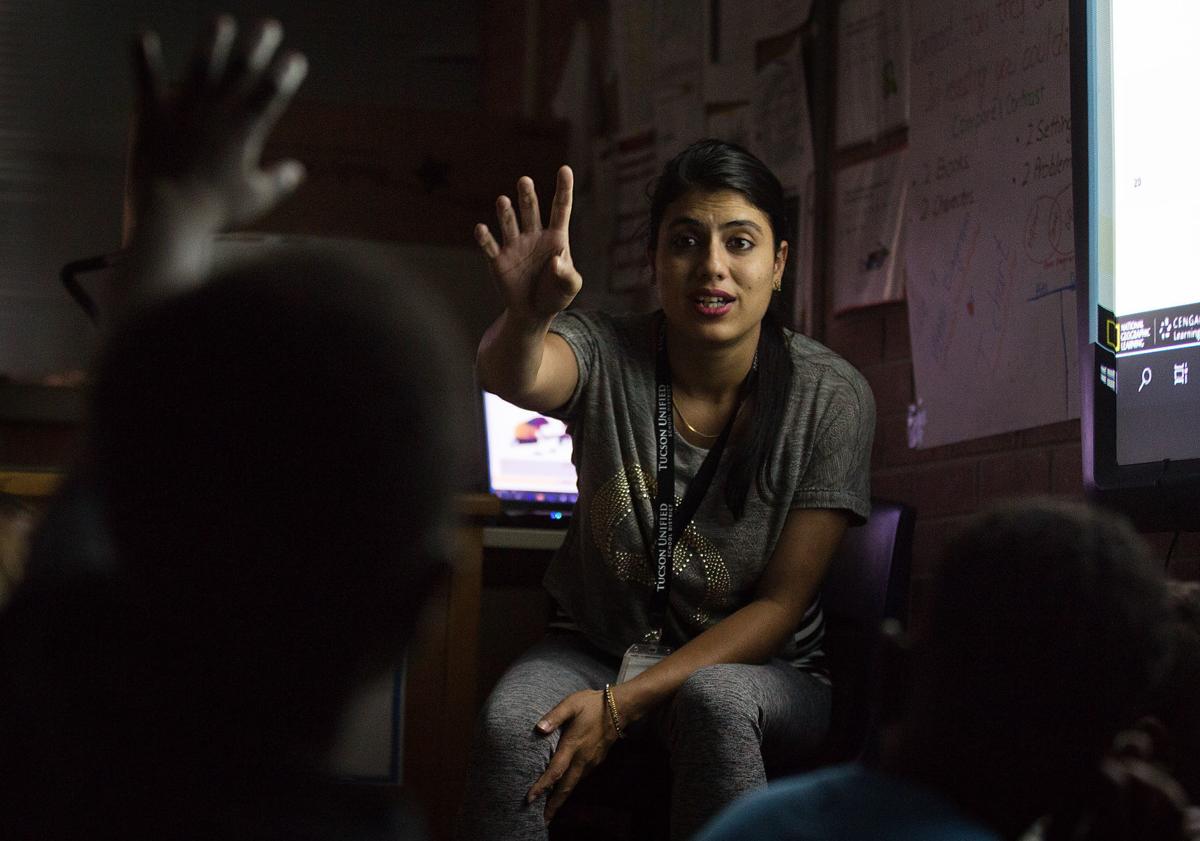School districts across Pima County continue to look overseas to help fill teacher vacancies, especially in the sciences and special education.
Math teacher Arneil Aro arrived from the Philippines about a month ago.
He begins his classes with his students at TUSD’s Magee Middle School lined up for their personalized handshake, one of his new classroom traditions since arriving in the U.S. with 26 years of teaching experience.
Aro was one of six teachers who came from the Philippines to teach at Magee this year — three math teachers and three special-education teachers. Although there are differences between classrooms in the U.S. and overseas, Aro’s experience with students crosses cultures.
“It’s very hard to teach if you don’t love your students,” says Aro. “It’s easy to get angry if you don’t love your students. I learn patience and understanding. I learn to love the students and that they have individual needs.”
This is the second year that several Pima County school districts have hired teachers internationally to lower high vacancy rates, a problem across Arizona due to low teacher salaries.
Despite raises across Arizona schools, following massive protests by the Red for Ed movement, teachers in the state made an average $49,000 last year, substantially lower than neighboring states. The state is ranked 49th in teacher pay in elementary schools and 48th in secondary schools, according to Expect More Arizona, a nonpartisan education advocacy group.
Tucson Unified School District hired 14 teachers from India last year, who have all renewed their contracts for a second year, according to Director of Human Resources Renée Heusser. The district hired 17 teachers this year from the Philippines. And TUSD is still looking at international applicants to continue filling vacancies, Heusser says.
TUSD began the school year with 62 teacher vacancies, 26% less than last year, according to numbers provided by the district.
Catalina Foothills School District hired three international teachers this year: two high school math teachers and a high school chemistry teacher, according to district spokeswoman Julie Farbarik.
Sunnyside Unified School District hired 23 international teachers over the last two years, of which 70% are special education teachers. The district looked internationally for hard-to-fill positions, said Leila Williams, the district’s exceptional-education director.
“Ideally, we’d like to be able to recruit from our major universities here in Arizona,” Williams said. “There’s such a small pool coming out of the universities that it’s hard. ... So working with an agency that can help recruit international teachers has really filled that need.”
Sunnyside was able to start the school year with one-third fewer vacancies than last year, according to numbers provided by the district.
Williams said the school year began with no special-ed teacher vacancies, although there is still a shortage of aides for those classes. The international teachers Sunnyside hired last year all renewed their contracts.
Williams says the special-education teachers all have the required experience and credentials, including master’s degrees, and in some cases they have more experience than their American counterparts.
“They have a really broad knowledge base of children with disabilities,” she said.
The international teachers are coming to the U.S through the Exchange Visitor Program, or J-1 visa. Across the state, schools hired 187 international teachers last year through the program. It is meant to promote “the interchange of persons, knowledge, and skills, in the fields of education, arts, and science,” according to U.S. Citizenship and Immigration Services. The visa participant typically covers any costs, with no cost to schools or districts.
Teachers with the program have a minimum of two years’ professional experience and at least the equivalent of a U.S. bachelor’s degree, according to the U.S. State Department. The J-1 visa is good for three years and can be extended for another two. Applicants are required to go through a designated sponsor, who oversees the application process.
TUSD has hired teachers through three organizations, and Heusser says some offer more support than others. A placement agency and a training agency contacted the district directly with the idea, and Magee Middle School found their teachers directly, through a sponsor.

Six teachers from the Philippines joined the faculty at Magee Middle School this year — three math teachers and three special-education teachers. Pictured are, from left, teachers Andrea Pasilan, Arneil Aro, Martha Isiderio, Marites Relota, Principal Jason Lindsay, Assistant Principal Nina Rojas, and teachers Christen Hoyo-a and May Italia.
Support for new arrivals varies
When Aro first arrived in Phoenix, he got his fingerprint card, a Social Security card and took care of business at the state Department of Education.
He called Magee Principal Jason Lindsay at 8:30 that night and said he was going to sleep overnight at a Greyhound bus station because there were no tickets to Tucson until the next day.
“We’re not going to do that,” Lindsay remembers telling Aro. “Our teachers — we don’t do that to them.”
Lindsay picked Aro up that night and invited him to spend two nights at his house until Aro’s apartment was ready.
Over the next several weeks, Aro’s compatriots arrived — not just as new colleagues but also as roommates. The six Filipino teachers, most who have spouses and children back home, all live in two neighboring two-bedroom apartments, a five-minute walk from the school near East Speedway and North Camino Seco.
Aro and two other newly arrived math teachers, Christen Hoyo-a and May Italia, say their sponsor, through the State Department, gave them a handbook and not much more support.
The teachers only had some clothes they brought with them.
So their new principal helped put together an online sign-up to collect household supplies and furniture. It was shared with Magee employees and local churches. Lindsay also took the teachers shopping for groceries while they waited for their first paychecks.
With close to three decades as an educator, Aro’s salary is the same as any experienced teacher new to the district, and he receives a $5,000 one-time hiring incentive for hard-to-fill positions. TUSD teachers with 15 or more years of experience start at $46,700, and if they have a master’s degree, which Aro does, they receive an additional $2,000 annually.
In the Philippines, Aro says he was paid about $400 a month. He plans to send most of salary home to his wife, four grown children and two grandchildren.
Last year, the district hired teachers through the training company HireSchoolTeachers. Managing director Raj Khillan says he saw a need after several Indian friends came overseas to teach in the U.S. He says they struggled, not being familiar with teaching differences between the two countries.
“The first year was such a disaster where they almost quit, and the school wasn’t happy with them,” he says.
HireSchoolTeachers launched in 2016 and trains international teachers in the U.S.-style of classroom management, developing lesson plans and teaching children with special needs.
After months of initial training in their home countries, HireSchoolTeachers puts together profiles of the teachers with their credentials, résumés and video résumés. And training continues after the teachers are settled in the U.S., with biannual workshops in professional development.
In the last two years, HireSchoolTeachers trained 39 teachers who were hired by Arizona schools and districts.
This year, TUSD hired 10 international teachers who were vetted through the placement agency Teach Quest. The organization mainly works with teachers in the Philippines, specializing in finding special-education and math teachers, says Peter Perkins, a company spokesman.
“That’s what schools are looking for,” Perkins said. “They’re not able to find it locally. ... Those are positions we have nationwide shortages in.”
Teach Quest screens applicants for English competency, teaching qualifications and mindset. Perkins says they look for applicants whose teaching style is progressive and centered on students.
The agency gives the teachers a few days of formal training in classroom management and cultural orientation to help them better understand the diversity of customs and cultures in the U.S. And they connect the teachers with a sponsor and employment opportunities.
Once the teachers are here, Perkins, who has 28 years’ experience as an educator, offers hands-on assistance across a variety of topics, like classroom management and communicating with co-workers.
Teach Quest also helps the teachers get situated, from getting them at the airport to arranging housing and setting up utilities.
The teachers pay thousands of dollars upfront for the kind of support these agencies offer.
The entire HireSchoolTeachers program costs $4,000 to $5,000, which the teachers can pay in installments, Khillan says.
Teach Quest works with a recruitment agency that charges the teachers $1,600. The teachers pay Teach Quest a $3,000 placement fee, and they typically pay another $1,500 to $2,000 to their sponsor, according to Perkins.
Schools become like family
Megha Sharma, an international teacher at TUSD’s Myers Ganoung Elementary School, is in her second year as a third-grade teacher to English-language learners.
Before coming to the U.S., Sharma was teaching seventh through ninth grades in Punjab, India. She wanted to do the cultural exchange program to grow as an educator.
“Whatever I learn over here, whenever I go back to my country, I will definitely want to apply these strategies,” Sharma said. “That’s going to help me and my kids as well.”
Sharma had some formal training on the U.S.-style of teaching, and she did her own research, watching videos about American classrooms and the various methods teachers use.
The teaching strategy she already had crosses the cultural divide: love for her students and the bonds she forms with them.
Despite her love of teaching, Sharma had a hard time adjusting when she first arrived in Tucson. She started about a month into the school year and felt out of place. But thanks to a supportive and caring atmosphere, she began to form bonds with her students and colleagues.
Sharma learned teaching techniques from mentors, fellow teachers and her principal. And she spent a lot of time on her lesson plans, constantly refining them.
“Slowly and gradually, I felt I got a lot of support, especially in this school,” Sharma said. “It’s just like a family, and I was able to build a very, very strong relationship with my kids.”
Myers Ganoung, near East 29th Street and South Rosemont Avenue, is awaiting another international teacher, from the Philippines, who could arrive in two weeks.
Principal Megan Stefanek, said that five years ago the school had a lot of long-term substitute teachers, at least in part due to a change in leadership at the school. This year, the school started off fully staffed. Stefanek says fewer subs provides important consistency for students.
“It’s really hard when you have different people coming in and out of their classrooms, setting different procedures,” Stefanek said.
“The sky’s the limit when they build those relationships with their teachers.”






